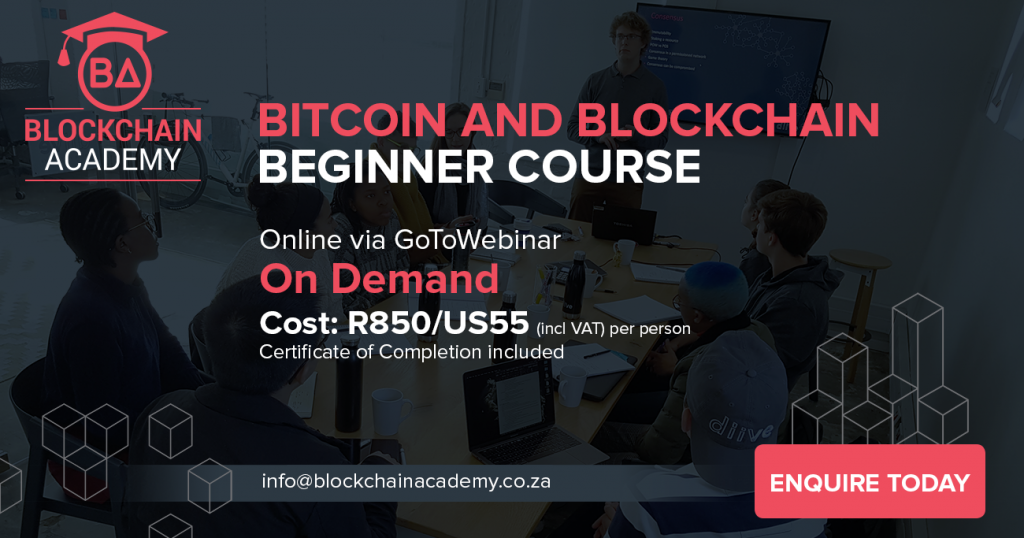Bitcoin and Blockchain Beginner Course
On demand: Groups of 10 or more: in-person classroom-style or online
There is a lot of excitement lately about the opportunities that cryptocurrencies and its underlying technology, the blockchain offers. From trading, investing, mining or using the technology to streamline existing systems and processes, the opportunities most definitely exist.
The Bitcoin and Blockchain Beginner course is for individuals who are new to cryptocurrencies and blockchain technology. The course covers the basics of money, bitcoin and the blockchain, how to use bitcoin: buy and sell bitcoin; send and receive bitcoin; and how to store bitcoin in a wallet, bitcoin and wallet security, compliance and regulation, use cases and opportunities this technology provides. It also includes alternatives to bitcoin and the Bitcoin blockchain.
The outcome of this course is to provide individuals with a general overview of bitcoin and blockchain technology. This course provides attendees with an insight into the future of this technology in terms of innovation and disruption of existing traditional systems and processes.
Similar to how the internet completely changed how people digitally share information, blockchain technology is revolutionising the storing and transacting of value.

Requirements:
- No previous understanding of cryptocurrencies and blockchain technology is required
- An interest in bitcoin and blockchain technology
More Information
- Price: From R850 per person for group training with a minimum of 10 attendees
- Type: Online with instructor or in-person, classroom-style
- Duration: Flexible to suit clients requirements with an average of 4 hours, including short breaks
- Certification: Attendees receive a Certificate of Completion at the end of the course if attendance was complete
Module 1: Introduction
- Money and currency
- Digital currencies explained
- History of Bitcoin
Module 2: The Blockchain
- 101 of a blockchain
- How are transactions stored on a blockchain
- What Bitcoin mining is
- Permissioned and permissionless blockchains
Module 3: Using Bitcoin
- Where and how to get bitcoins
- How to store bitcoins in a wallet
- How to send and receive bitcoins
- How to trade bitcoins on on-line exchanges
- Bitcoin pricing and volatility
Module 4: Bitcoin Security
- Security issues and the pseudo-anonymity of Bitcoin
- Security measures such as multi-signature transactions
- Backing up and restoring wallets
Module 5: Bitcoin Scalability, Risks and Limitations
- Transaction volumes and block sizes
- Block propagation speed
- Proof of Work efficiencies
- Mining pools and centralisation
- Mining rewards and incentivisation
- Bitcoin scaling proposals
Module 6: Use Cases and Opportunities
- Payment rails
- Immutable ledger
- Coloured coins and digital asset ownership
- Time-stamped records
- Proof of ownership
- Micro-transactions
Module 7: Merchant Acceptance
- How to integrate Bitcoin as a payment method
- Benefits of using Bitcoin as a payment method
- Payment processing companies
- Verification of transactions on the blockchain
- Successful case studies
Module 8: Bitcoin Compliance and Regulation
- Regulation globally and in South Africa
- Bitcoin compliance
- Money laundering and fraud
Module 9: The Future of Blockchain
- Smart contracts
- Bitcoin for remittances in emerging economies
- Innovation for financial institutions
- Innovation for non-financial institutions
- The value of bitcoin and the blockchain as a technology
- Alternatives to bitcoin and the blockchain